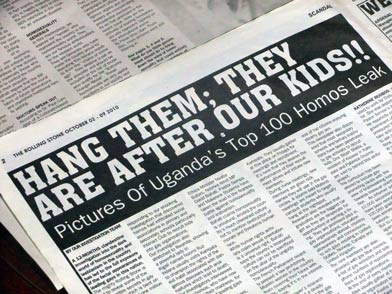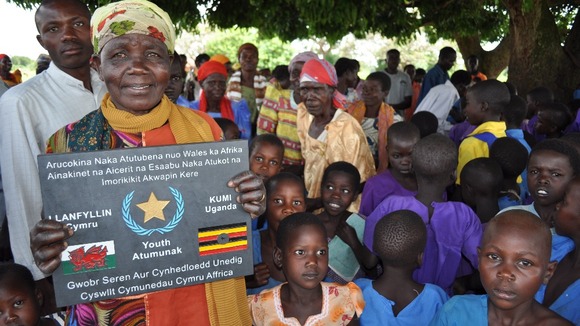I could see this coming a mile off, but
a week-long trip by the First Minister to Uganda has prompted
criticism, from both the opposition and his own party, due to Uganda's
recent moves to bring in harsh criminal penalties for practising (and suspected)
LGBTs and gay rights campaigners.
Uganda's parliament recently passed the Anti-Homosexuality Bill. It's still waiting Presidential approval, but could result in life imprisonment for anyone caught engaging in what we would consider consensual sexual acts.
The law will also mean a prison sentence for "failing to report a homosexual", and provides financial incentives for people to turn each other in to the authorities. It also includes clauses whereby Uganda withdraws from any international treaty that's "contradictory to the spirit of the Act".
It's actually a watered-down version. The original Bill, which failed to pass, included the death penalty for homosexuality.
The process has included some of the most disgusting propaganda against a minority group since the 1930s – (infamously) accusing homosexuals of routinely practising coprophagia, for example, as well as paedophilia and accusations of inciting genocide.
Uganda's parliament recently passed the Anti-Homosexuality Bill. It's still waiting Presidential approval, but could result in life imprisonment for anyone caught engaging in what we would consider consensual sexual acts.
The law will also mean a prison sentence for "failing to report a homosexual", and provides financial incentives for people to turn each other in to the authorities. It also includes clauses whereby Uganda withdraws from any international treaty that's "contradictory to the spirit of the Act".
It's actually a watered-down version. The original Bill, which failed to pass, included the death penalty for homosexuality.
The process has included some of the most disgusting propaganda against a minority group since the 1930s – (infamously) accusing homosexuals of routinely practising coprophagia, for example, as well as paedophilia and accusations of inciting genocide.
 |
| Homophobia in Uganda has reached hysterical levels due, in part, to the missionary teachings of "fire and brimstone" evangelical Christians. (Pic : The Guardian) |
It's worth
pointing out that Uganda hasn't been gay-friendly for a long time.
LGBTs have been murdered, and the Ugandan media has published contact details of prominent LGBTs and gay rights campaigners (which has since been ruled illegal), inciting the public to
kill them.
It's also worth pointing out that there are plenty of neighbouring nations that criminalise LGBTs, and around 70 nations globally.
Uganda's situation was partially caused by a high-profile "anti-gay conference" backed by evangelical fundamentalist Christians from the United States. The result was a moral panic, and something that increasingly resembles a pogrom.
Firstly, it's right to say the First Minister's trip isn't an endorsement of anything the Ugandan Government are doing. He's going for a specific reason – to visit Wales for Africa projects in the city of Mbale. The projects include a new girls school dormitory (funded by Pontypridd High School pupils) and a health project in partnership with the Royal Glamorgan Hospital.
Wales doesn't have any formal diplomatic relations with any nation state – because Wales isn't independent – so Welsh ministers aren't bound to the same nuances of diplomatic relations that other heads of (full) government and state are.
David Cameron visiting Uganda, for example, would prompt more outrage and coverage, while Carwyn Jones is low profile enough to slip under the radar and draw a quieter chorus of criticism. He can, quite justifiably, turn around and say, "promoting human rights abroad is above my pay grade".
IIRC, Mrs Jones works/worked for Amnesty International, and the First Minister himself is a member, so I'm sure he's well-versed in the importance of basic human rights. You could say he made the trip knowing full well it would prompt discussion on human rights in Uganda amongst the Welsh chattering classes. We're discussing it now, aren't we?
You can also say it displays a shocking ignorance of current affairs, and a blasé attitude to human rights in the developing world – placing photo-ops with aid projects ahead of it.
Ann Jones AM (Lab, Vale of Clwyd) believes the First Minister should raise the issue on his visit, but she's one of the few Welsh Labour backbenchers who's willing to speak out on occasion. Steve Brooks – former head of Oxfam Cymru and member of LGBT Labour - has also criticised the trip.
They join Plaid Pride (LGBT grouping), who said the aid projects are important and valuable, but that if he went, "at the very least he should take this important opportunity to speak up about the human rights of LGBT people."
The party's Equalities spokesperson, Lindsay Whittle AM (Plaid, South Wales East), acknowledged that while the First Minister would condemn the law, the visit could be misinterpreted by Ugandan politicians, who might think it's "business as usual".
However, if the First Minister does/did speak out against the measures, it might be considered an attempt at imposing Western values/colonialism (ironic considering the anti-gay laws are, in part, a relic of the British Empire), which is how international opposition to the Anti-Homosexuality Bill could be interpreted by many in Uganda.
Weighing it all up, the trip should've been called off.
It's right and proper he explain himself to the Senedd next week too. This is perhaps more serious than he, and civil servants, thinks it's going to be. He's lucky it hasn't been reported outside Wales to any significant degree yet.
If they're going to justify this through the aid project visits alone (which is the official Welsh Government line), or because "it was arranged in advance", Leo Abse's ashes will spin in their urn. I suspect some in his own party are going to seriously question Carwyn Jones' judgement as First Minister for the first time.
It's also disappointing because the National Assembly, at least, has consistently placed highly on Stonewall's list of LGBT-friendly employers. This blemishes them a little bit, even if the Welsh Government is separate.
It's also worth pointing out that there are plenty of neighbouring nations that criminalise LGBTs, and around 70 nations globally.
Uganda's situation was partially caused by a high-profile "anti-gay conference" backed by evangelical fundamentalist Christians from the United States. The result was a moral panic, and something that increasingly resembles a pogrom.
Firstly, it's right to say the First Minister's trip isn't an endorsement of anything the Ugandan Government are doing. He's going for a specific reason – to visit Wales for Africa projects in the city of Mbale. The projects include a new girls school dormitory (funded by Pontypridd High School pupils) and a health project in partnership with the Royal Glamorgan Hospital.
Wales doesn't have any formal diplomatic relations with any nation state – because Wales isn't independent – so Welsh ministers aren't bound to the same nuances of diplomatic relations that other heads of (full) government and state are.
David Cameron visiting Uganda, for example, would prompt more outrage and coverage, while Carwyn Jones is low profile enough to slip under the radar and draw a quieter chorus of criticism. He can, quite justifiably, turn around and say, "promoting human rights abroad is above my pay grade".
IIRC, Mrs Jones works/worked for Amnesty International, and the First Minister himself is a member, so I'm sure he's well-versed in the importance of basic human rights. You could say he made the trip knowing full well it would prompt discussion on human rights in Uganda amongst the Welsh chattering classes. We're discussing it now, aren't we?
You can also say it displays a shocking ignorance of current affairs, and a blasé attitude to human rights in the developing world – placing photo-ops with aid projects ahead of it.
Ann Jones AM (Lab, Vale of Clwyd) believes the First Minister should raise the issue on his visit, but she's one of the few Welsh Labour backbenchers who's willing to speak out on occasion. Steve Brooks – former head of Oxfam Cymru and member of LGBT Labour - has also criticised the trip.
They join Plaid Pride (LGBT grouping), who said the aid projects are important and valuable, but that if he went, "at the very least he should take this important opportunity to speak up about the human rights of LGBT people."
The party's Equalities spokesperson, Lindsay Whittle AM (Plaid, South Wales East), acknowledged that while the First Minister would condemn the law, the visit could be misinterpreted by Ugandan politicians, who might think it's "business as usual".
However, if the First Minister does/did speak out against the measures, it might be considered an attempt at imposing Western values/colonialism (ironic considering the anti-gay laws are, in part, a relic of the British Empire), which is how international opposition to the Anti-Homosexuality Bill could be interpreted by many in Uganda.
Weighing it all up, the trip should've been called off.
It's right and proper he explain himself to the Senedd next week too. This is perhaps more serious than he, and civil servants, thinks it's going to be. He's lucky it hasn't been reported outside Wales to any significant degree yet.
If they're going to justify this through the aid project visits alone (which is the official Welsh Government line), or because "it was arranged in advance", Leo Abse's ashes will spin in their urn. I suspect some in his own party are going to seriously question Carwyn Jones' judgement as First Minister for the first time.
It's also disappointing because the National Assembly, at least, has consistently placed highly on Stonewall's list of LGBT-friendly employers. This blemishes them a little bit, even if the Welsh Government is separate.
It's strange that a visit to an aid project as a
representative of the Welsh people should prompt an apology or
contrition, but that's the case this time. A decent explanation and
justification should be enough though.
It also raises wider questions about Welsh foreign policy. I'm going to come back to that in the summer, hopefully.
You might think it's fanciful to suggest Wales even has a foreign policy because we're represented internationally via the UK.
Bits and pieces of it are already in place. It's things like overseas offices (mini embassies), Wales for Africa itself (an example of a Welsh foreign aid programme), our various roles within the European Union and, indeed, ministerial visits abroad (de facto ambassadors).
Even as part of the UK, we still have to think about (or rather the Welsh Government and Assembly have to think on our behalf) what role Wales wants to play in the world, how Wales looks on the world stage, and what sort of values does Wales want to promote – whether that's our own values, or universal values laid down by the international community and international convention.
That includes opposing discrimination against LGBTs.
It also raises wider questions about Welsh foreign policy. I'm going to come back to that in the summer, hopefully.
You might think it's fanciful to suggest Wales even has a foreign policy because we're represented internationally via the UK.
Bits and pieces of it are already in place. It's things like overseas offices (mini embassies), Wales for Africa itself (an example of a Welsh foreign aid programme), our various roles within the European Union and, indeed, ministerial visits abroad (de facto ambassadors).
Even as part of the UK, we still have to think about (or rather the Welsh Government and Assembly have to think on our behalf) what role Wales wants to play in the world, how Wales looks on the world stage, and what sort of values does Wales want to promote – whether that's our own values, or universal values laid down by the international community and international convention.
That includes opposing discrimination against LGBTs.
















0 comments:
Post a Comment